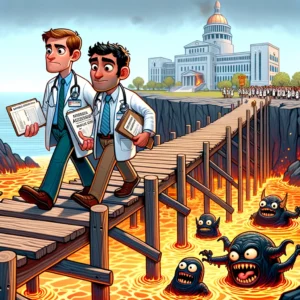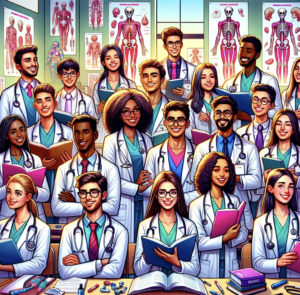
As spring is upon us, a new crop of aspiring doctors begins their medical school application process! At the heart of your application is your AMCAS Personal Statement, which asks you a simple question: why medicine? During our 15 years of helping hundreds of medical school applicants earn admission to their dream schools, we have worked with clients to help them craft unique responses to this question that resonate with their experiences and come across as genuine, compelling, and personal. Here are some tips for you on how you should think about -and respond to- this question.
- Start with your personal story: The best way to make your response original is to use moments, challenges, successes, and failures from your life. Your personal story is a unique and powerful tool for communicating why you are drawn to medicine. This can include experiences you’ve had with healthcare providers, exposure to medical challenges faced by loved ones or your community, or a moment when you first realized your passion for medicine.
- Highlight your experiences: Discuss any relevant experiences you’ve had in the medical field, such as volunteering at a hospital, shadowing a healthcare provider, or participating in a healthcare-related research project. Discuss what you learned from these experiences and how they have shaped your perspective on medicine.
To avoid your essay being a cliché, strive from depth in your personal statement, not breadth. What this means is getting very specific about a particular experience -an EXACT moment or conversation- and how it shaped you. An exercise that I like to do with clients is to say, “if you have to take me to a precise moment in a time machine, where would you set the dial?” This forces you to have a specific entry point to a story that would help me understand it so that you might say, “on my third day at the clinic, I met Fred, whose leg infection had gone septic…” instead of saying, “my time volunteering at Detroit Mercy opened my eyes.” Specificity is the difference between a well-told story and a boring one.
- Emphasize your understanding of the field: Show that you have a deep understanding of the field of medicine and the challenges that healthcare providers face. This can include discussing current issues in the healthcare system, such as access to care, the opioid epidemic, or the impact of social determinants of health. BUT, only do this if you in fact have the insight and experience to do so. Faking it will be easily detected, if not by the reader then certainly by a future interviewer who asks you about it!
- Express your passion: Share your passion for medicine and what motivates you to pursue a career in this field. Explain why you believe that medicine is more than just a job, but a calling to help others and make a difference in the world. If there is a single idea that you want to convey, it is positive excitement. People are attracted to optimism and energy, so find a way to convey that.
- Demonstrate your commitment: Show that you are committed to the field of medicine and that you understand the sacrifices and dedication required to succeed. Discuss your long-term goals and how they align with your passion for medicine. For every goal you seek to identify, first ask yourself, “what experiences have I had that prepared for pursuing this goal?” and “what about my past explains this goal?” and “what about my past justifies my belief that I can attain this goal?” Answering these three questions will help your aspirations come across as more believable and, importantly, allow you to SHOW your commitment to medicine by reference to things you’ve done.
- Be specific: Instead of simply stating that you want to become a doctor, be specific about why you are interested in a particular specialty or aspect of medicine. Discuss what attracts you to this area of medicine and what you hope to achieve in this field.
- Be honest: Be honest about your motivations for pursuing a career in medicine. Don’t try to sound like someone you’re not or exaggerate your experiences or achievements. Admissions committees can usually tell when someone is being insincere. This goes beyond lying, of course. Essays that are built purely around the idea of “tell the reader what they want to hear” usually feel hollow and insincere and, perhaps worst of all, come across as cliché.
- Edit and revise: Make sure your response is well-written, free of typos and grammatical errors, and that it clearly communicates your passion for medicine. Ask someone you trust to review your response and provide feedback.
- Address any weaknesses: If there are any red flags in your application, such as a low GPA or MCAT score, take the opportunity in your response to the “why medicine?” question to address these weaknesses and explain how you have overcome them. Remember, you can’t just avoid talking about bad moments and hope that the AdCom somehow misses it. They won’t. Thus, if it comes up in the meeting about your application, you’ll want to be sure that you frame it.
Here is a video that I did to help MBA applicants, and though the examples I use are business-related, the core ideas are the same. Or, if you want the “TLDR” version without the specifics, check this out!
- Be yourself: Finally, be yourself in your response. Admissions committees are looking for applicants who are passionate, knowledgeable, and well-suited to the field of medicine. Your unique perspective and experiences are what make you a strong candidate, so be sure to let your personality shine through in your response.
All told, the “why medicine?” question is an opportunity to demonstrate your passion for the field, your understanding of the challenges and rewards of a career in medicine, and your commitment to pursuing a career in this field. By following these tips, you can craft a compelling response that will help you stand out in the medical school application process.
For more help with your personal statement, check us out at Gurufi.com. Our personal statement editors and consultants have decades of experience helping clients get into top medical schools. Our specialty is helping you craft compelling personal statements, Work & Activities sections, secondaries, and residency letters that move the needle in your admissions process! For questions, shoot us an email at service@gurufi.com. Check us out on Facebook, Twitter, and LinkedIn.







